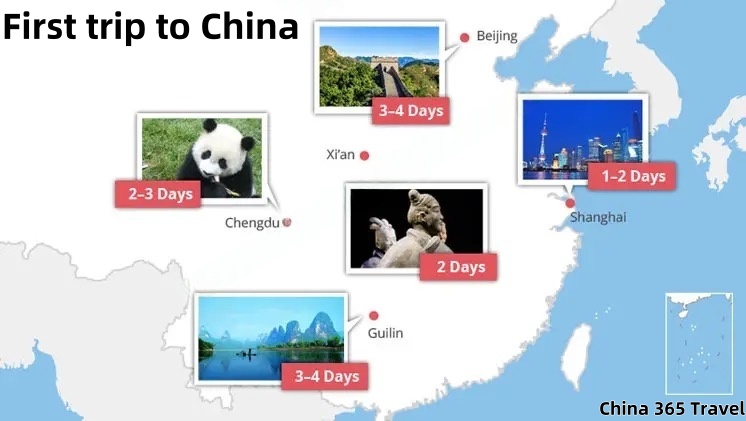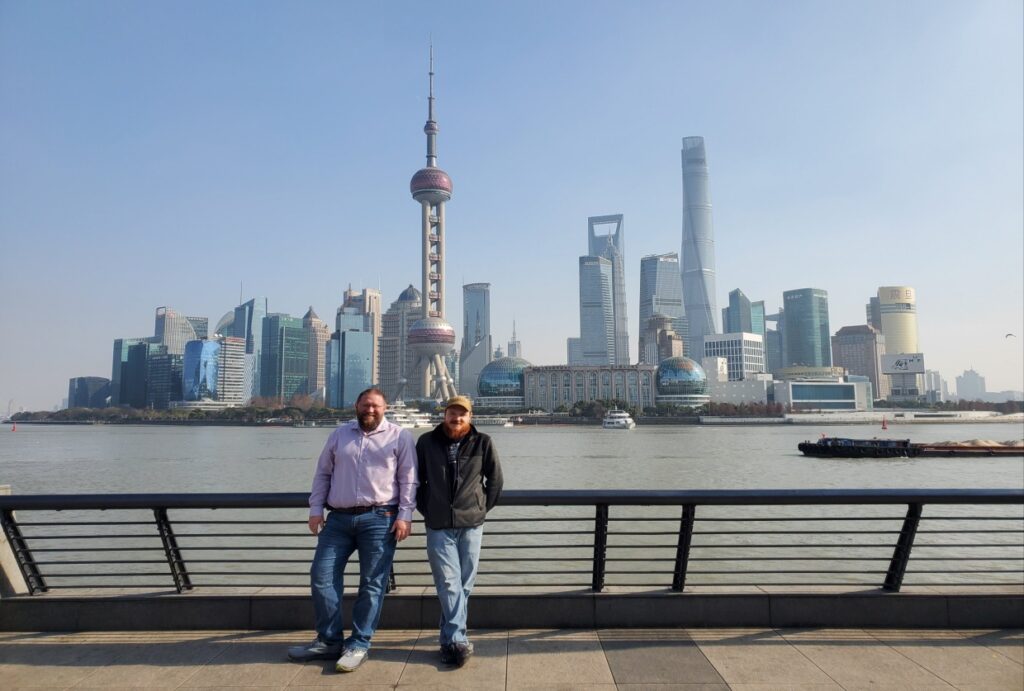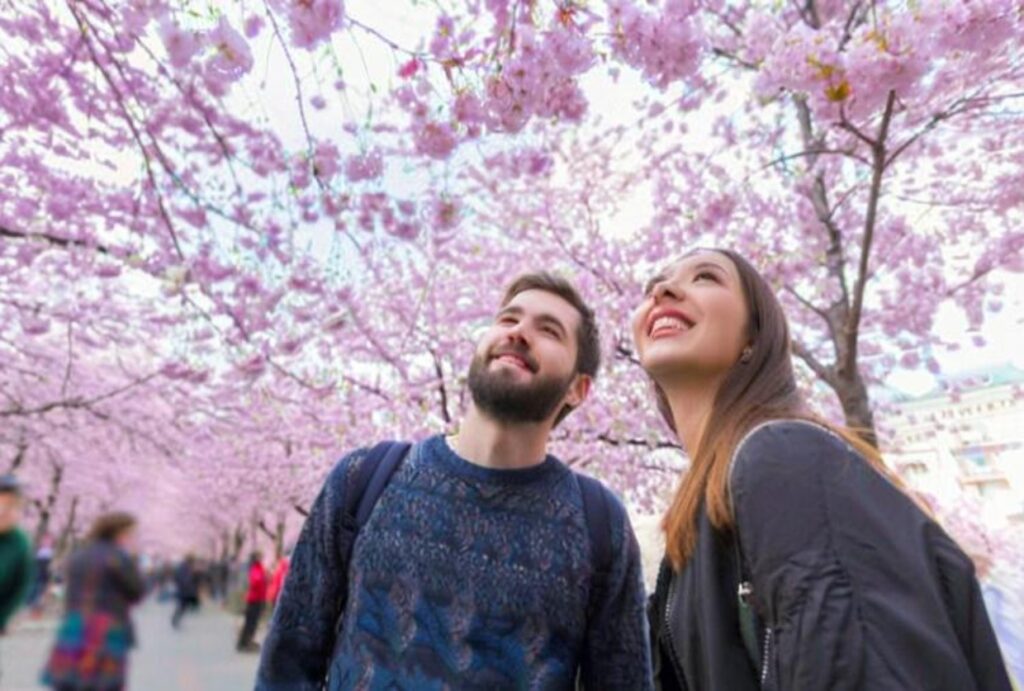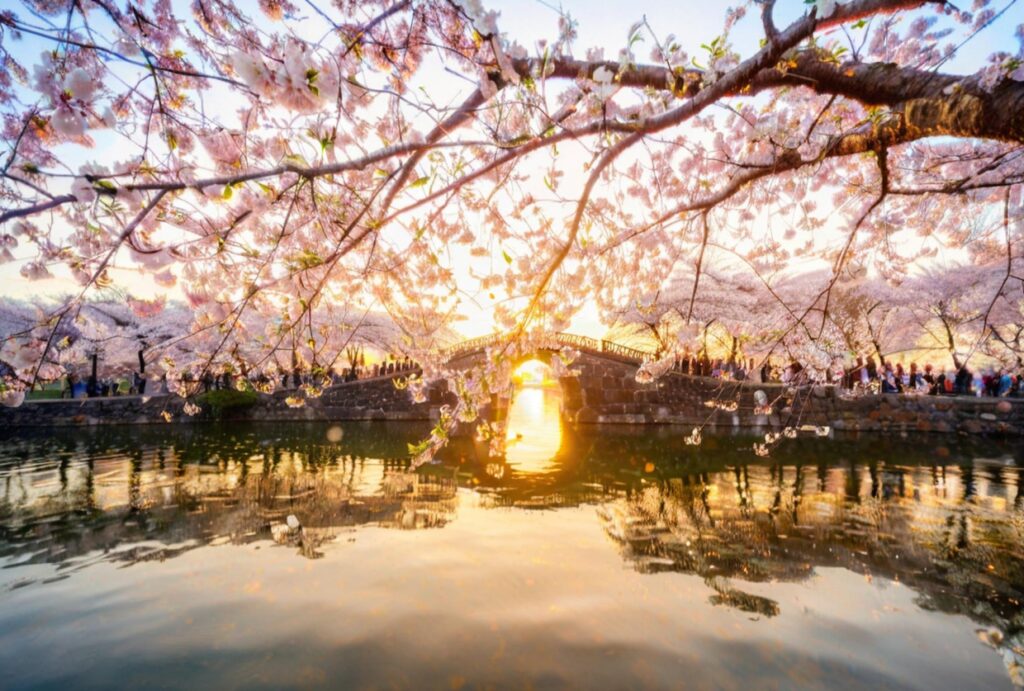First trip to China
1. Choosing where to go
Based on our knowledge of China and feedback from our clients, we recommend the following five destinations for first-time travelers to China. Each destination is unique: ancient culture, breathtaking natural beauty, modern city life, and even a chance to get up close and personal with China’s beloved giant pandas.

1) Beijing - Exploring China's Imperial History
If you’re visiting China for the first time, Beijing is the ideal starting point, bringing together ancient dynasties, iconic architecture and vibrant local life.
The Great Wall and the Forbidden City are must-see attractions. Want to experience a different kind of tour? Why not try visiting the Forbidden City in a Chinese dress. It’s photogenic and a great way to experience a deeper cultural heritage.
Want to experience the new atmosphere of the Great Wall? Why not go to Badaling to experience a drone-delivered tour of the Great Wall (a fun blend of tradition and technology). Or, head to Jinshanling to enjoy a sunset picnic on a quieter, more scenic stretch.
You can also get a taste of everyday life with a guided hutong walk, where Beijing’s old neighborhoods still retain their vibe.
If you’re traveling with children, spend a day at Universal Studios Beijing Resort or enjoy fun and educational activities such as tai chi in the parks, learning calligraphy and visiting local families in the hutongs.
While in Beijing, you can also experience China’s futuristic lifestyle, from smart home demonstrations to rides in self-driving cars.


2) Shanghai - China's Window to the Future
Shanghai is where China looks to the future. The city boasts a dazzling skyline, global flavor, and a vibrant contrast of old and new.
Take a ferry ride across the Huangpu River. You’ll see the historic buildings of the Bund and the modern skyscrapers across the river, giving you a sense of the stark contrast between modern life and post-imperial history.
We have designed an in-depth Bund Cultural Discovery Walking Tour especially for those who want to learn more about the Bund and the interesting stories of old Shanghai.
You will walk a route that few tourists find on their own, see the original bricks and hear interesting stories that you will never find in history books.
To experience the softer side of the city, we suggest you stroll through the tree-lined streets of the French Concession, where Art Deco villas, boutique cafes and local life blend perfectly.
If your time permits, you can extend your trip to Hangzhou or Suzhou to visit the water towns and classical Chinese gardens.

3) Xi'an - Traveling through 2,000 years of history
If you are interested in China’s ancient roots, Xi’an is a place not to be missed. As the ancient capital of the 13th Dynasty and the starting point of the Silk Road, Xi’an offers you the opportunity to delve into the roots of Chinese civilization.
The Terracotta Warriors and Horses are the city’s most iconic highlights. You can also visit a little-known museum near the Terracotta Warriors to see the first restored terracotta warriors up close.
Step inside a real conservation lab where, under the guidance of expert restorers, you’ll try to piece together a miniature Terracotta Warrior using authentic Qin Dynasty pieces.
In the evening, don’t miss the Great Tang Night City. This boulevard is brilliantly illuminated with street performers, street entertainers and musical performances. It’s the perfect place to experience the modern pulse of Xi’an with the charm of the Tang Dynasty.
Xi’an is also a favorite among Han Chinese photography enthusiasts. The city’s many historic buildings and flavorful streets form the perfect backdrop. We can help you dress up and capture everything from palace walls to quiet temples.

4) Guilin - visit China's most iconic landscape
First-time visitors to Guilin will fall in love with the beautiful scenery and relaxing places away from the hustle and bustle of the city. It is a classic masterpiece of the Chinese countryside.
A boat trip on the Li River is the best way to enjoy the karst peaks and the Li River.
Yangshuo and Longsheng are two counties near the city of Guilin, concentrating most of Guilin’s famous attractions.
In Yangshuo, kids can put down their cell phones and iPads and have fun …… biking around the idyllic countryside, exploring unexplored karst caves, and even experiencing how Chinese farmers live and work.
Yangshuo also offers a naturally romantic atmosphere for couples. A romantic riverside candlelit dinner in a quiet garden in the mountains is a great way to celebrate anniversaries such as 20th, 30th and 40th. Contact China 365 Travel to create an exclusive and exclusive time for you.
If you are interested in ethnic minority cultures, then Longji Terraces in Longsheng is indeed a highlight, offering both magnificent terraces and a chance to experience the world of the Zhuang and Yao ethnic groups.

5) Chengdu - Close Encounter with Giant Pandas
If pandas are on your must-see list (and they are for most travelers), then Chengdu is definitely the place to be. But there’s more to this laid-back city than just the adorable black and white pandas.
An even more special experience is to get up close and personal with the pandas by joining our Giant Panda Volunteer Program – cleaning the glass of the panda enclosure, making panda food, watching the pandas eat, and more.
Beyond the pandas, Chengdu’s charm lies in slowing down the pace and savoring everyday life. You can sip tea at a century-old teahouse and listen to the locals playing mahjong; you can stroll through the markets in search of good food; or, you can get up close and personal with face-changing theater, meet the performers, and even learn some tricks.
You can also easily extend your trip to Jiuzhaigou National Park to enjoy its wonderland of turquoise lakes, colorful forests and magnificent alpine scenery.


If You're Looking for Something beyond the Classic Cities
■Yunnan: one of China’s most beautiful and diverse provinces if you like snow-capped mountains, slow-paced old towns and rich ethnic cultures.
■Zhangjiajie: Ideal for nature lovers, this is where you’ll find the levitating peaks from Avatar. You can walk the glass walkway and stroll amongst the fantastic stone pillars.
■Chongqing: If you like spectacular cityscapes, spicy hot pots and riding the monorail through skyscrapers, this mountain metropolis offers a vibrant, off-the-beaten-path atmosphere.
■Harbin: The perfect place to travel in winter. This snowy city shines with its magical ice festivals, Russian churches and ice fun for the whole family.
■Tibet: If you’re interested in sacred sites, serene monasteries and high-altitude beauty, then this spiritual journey will provide you with an unforgettable experience.
Need more trip suggestions?
2. Decide on the number of days of stay
Upon arriving in China after a long journey, you may not want to get more than a cursory overview of the country and take photos of some of the iconic sites.
We recommend that you set aside at least a week on your first trip to visit the three most popular cities: Beijing (3-4 days), Xi’an (2 days) and Shanghai (1-2 days). You can refer to our 8-day Beijing-Xi’an-Shanghai tour for inspiration.
The two-week itinerary allows you to have more free activities and colorful experiences. You can choose to visit places such as Chengdu (to see pandas), Guilin (to enjoy the natural beauty) or Zhangjiajie (to enjoy the magnificent mountain scenery). This way you’ll get a more in-depth experience without feeling too rushed.
If you want to explore in depth, plan for 3 weeks or longer. This will give you time to explore western China such as Tibet or Xinjiang, or to explore hidden gems in places like Yunnan or Guizhou, which are worth the slow trip.
Whatever your pace or interests, we can help you create a personalized, thoughtful and discovery-filled trip to China. Contact China 365 Travel. all trips can be customized.
3. Considering when to travel to China
The “best time” really depends on what you want to experience.
If you’re visiting iconic sites like the Great Wall, the Forbidden City or the Terracotta Warriors, spring and fall are usually the safest bets.
Between April and May or September and October, the weather is pleasant, the skies are clear and everything looks more photogenic.
Fall is usually slightly drier and warmer than spring, which makes long walks and outdoor activities more comfortable.
If you want to avoid the crowds and don’t mind slightly cooler mornings or evenings, then a more ideal time to travel might be March, early April or early November. There are fewer crowds then, prices are lower, and the weather is still suitable for sightseeing.
Although summer sounds hot, it’s actually not as hard as you might think. The rains are usually short showers rather than all-day downpours, and in cooler areas like Yunnan or Tibet, this is the best time of year.
With a little planning (and air conditioning), China’s summers are actually very livable, especially for families on school vacations.
Winters, on the other hand, are serene and affordable. You can head to Harbin for the Ice and Snow Festival, or stroll through the palaces of Beijing to avoid the usual crowds. If you don’t mind dressing warmly, winter is the perfect time to see China from a more serene perspective.
You can find more detailed tips on the best time to travel to China in our January-December travel recommendations.

4. What is the best way to travel in China?
Traveling within China may seem daunting at first glance because of the vastness of the territory and the sheer size of the cities. However, traveling around China is not difficult as the country has one of the most advanced, affordable and reliable transportation networks in the world.
For long distance travel, high speed trains are often the best option. They are clean, efficient, and incredibly fast. Train rides also allow you to enjoy the cityscape outside your window and gain a deeper understanding of what China is really like.
If you are pressed for time or traveling to a more distant location (e.g. from Beijing to Guilin), domestic flights may be a good option. Major airports are easily accessible and most routes have multiple flights per day. We will help you choose the most suitable flight time for your trip.
Getting around the city is much easier than you might think. Most major cities such as Beijing, Shanghai and Chengdu have modern subway systems with English signs and announcements. Cabs and ride-hailing apps (such as DDT, China’s version of Uber) are everywhere.
If you prefer a more relaxed experience, private drivers and guides are available. This will make you feel more relaxed, especially if you are traveling with children, seniors, or just want to enjoy a relaxed and convenient door-to-door service.
We’ll help you choose the right mode of transportation for your journey – high speed trains, smart flights, convenient local transportation – all arranged in a seamless way so you can focus on enjoying your journey.
5. Choice of accommodation
China has an abundance of lodging options, ranging from luxury international chain hotels to boutique courtyard hotels to home-style bed and breakfasts. But finding a hotel that meets your needs, comfort level and travel style can make all the difference.
If you’re looking for comfort and relaxation, international brands such as Hyatt, Marriott, Hilton or Intercontinental are readily available in major cities.
The staff at these hotels usually speak English and you can enjoy familiar services and amenities. If you are visiting China for the first time or traveling with children, these are the hotels for you.
If you want something with a little more character, boutique hotels, especially in places like Beijing’s hutongs, Guilin’s countryside, or Lijiang’s ancient city, can offer a unique cultural experience.
You might even wake up in a traditional courtyard with carved wooden beams.
We’ll help you find the right accommodation based on your preferences, whether it’s close to attractions or has special requirements (such as cribs, connecting rooms or early check-in).
Please note: not all Chinese hotels are licensed to receive foreign visitors, especially in smaller towns. But rest assured – we only recommend hotels that meet international standards and ensure a smooth stay for foreign travelers.
Need more trip suggestions?
6. Do I need a visa to go to China?
Traveling to China is now easier for most international travelers – no visa required.
If you are coming from most of Europe (e.g. Italy, Spain, Germany, France, Belgium, etc.), Southeast Asia (e.g. Singapore, Malaysia, Thailand, etc.), Australia or New Zealand, you can now enter China without a visa and stay for up to 30 days.
If you are coming from the USA, Canada, UK or one of the other 52 countries, there is still a good option: China now allows 10-day visa-free transit in most cities such as Beijing, Shanghai, Chengdu, Zhangjiajie, Chengdu and Guangzhou.
If you want to stay longer than 10 days, you will need a tourist (L) visa.

7. How much does a trip to China really cost?
Traveling in China is cheaper than many people think, especially once you arrive at your destination.
The biggest expense for most travelers is the international airfare, the price of which can vary greatly depending on the season and departure city.
Upon arrival in China, the cost of a private, comfortable trip is quite reasonable. Mid- to high-end private tours that include four- and five-star hotels, domestic transportation (air or high-speed rail), sightseeing, private guides, transfers, and lunches can be expected to cost around US$100 to US$350 per person per day.
Timing is important:
Hotel and airfares can increase by 50 to 100 percent during China’s peak travel periods, especially during the first weeks of May and October (known as Golden Week), summer vacations, and Christmas and New Year. Planning your trip to avoid these times can save you a lot of money.
Travel in the spring (March-April) or late fall (November) for better rates, pleasant weather and fewer crowds.
8. Learn how to pay in China: Easy Cashless Payments
China is one of the most cashless countries in the world. Whether in big cities or small towns, mobile payments have become the norm: from the subway to street food, people use their phones to pay for everything.
If you’re wondering, “Can foreigners use mobile payments in China now?” The answer is yes. It’s now easier than ever.
All you need to do is associate your international credit card (Visa/Mastercard) with a popular app like WeChat Pay or Alipay. Once set up, you can scan and pay like a local – no need to worry about exchanging cash or carrying coins.
Other options:
■Cash is still accepted, especially in more traditional places, although making change isn’t always convenient.
■Large hotels and some upscale restaurants or stores accept international credit cards, but many local attractions, small vendors or public transportation do not.
Need more trip suggestions?
9. Preparing for Internet access in China
Staying connected on the go is crucial, not only for navigating and translating apps, but also for sharing your experiences and keeping in touch with family and friends.
China’s internet environment is very specific: many popular global websites and apps, such as Google, Facebook, Instagram, WhatsApp and YouTube, are blocked in China. To access these sites and apps, you need to prepare in advance.
You can do the following:
■Get a reliable VPN (Virtual Private Network) before arriving in China. This will allow you to safely bypass restrictions and access your favorite apps and websites. We recommend that you choose a VPN that is fast and stable in China.
■Buy a local SIM card or rent a portable Wi-Fi device at the airport or online. This will give you fast 4G/5G data so you can stay online wherever you are. Make sure your phone is unlocked to use a local SIM card.
■Use apps that work well in China. Apps like WeChat are widely used in China and are essential for everyday life, from text messaging to mobile payments.
■If you want to avoid the hassle, we can help you arrange for a local SIM card before you travel so that everything is ready when you arrive.
Tip: Many hotels and cafes offer free Wi-Fi, but speeds and reliability vary. Having your own traffic package or portable Wi-Fi will ensure a smooth connection wherever you are.

10. Should I choose a guided tour?
Traveling independently in China is possible – but it’s not always easy, especially if it’s your first time.
With language barriers, complex transportation systems, and the sheer size of the country, even the simple things can be overwhelming. Booking tickets, navigating through train stations, or finding the right entrance to a large attraction like the Forbidden City can take up valuable travel time and energy.
That’s where guided tours come in.
A carefully planned private tour takes the guesswork and stress out of the process. You’ll have a local expert fluent in your language to take care of the logistics and share compelling stories to immerse you in the sights – sights you might miss if you went on your own.
Unlike traditional group tours, private tours are flexible. You decide the pace of your trip, your interests, the food and the atmosphere. Want to find a secluded spot on the Great Wall for a picnic? No problem. Want a hands-on experience like making dumplings with a local family? No problem.
If you’re traveling with kids or older family members, or just want to see more in less time, having a local to guide you makes a big difference.
Start planning your customized tour with one-on-one help from one of our travel consultants.
Why Choose China 365 Travel
★Customize your tour
Travel Advisor with roots in China
Immediate response, no waiting!
Direct Connections, Supreme Values
★Maximize your flexibility
- Your own private guide and journey
Explore at your own pace
- Unparalleled flexibility, not possible with group tours
★Ensuring Your Satisfaction
Top 20% of nationally ranked tour guides at your service
24/7 emergency support
Cultural In-depth Experience Service
